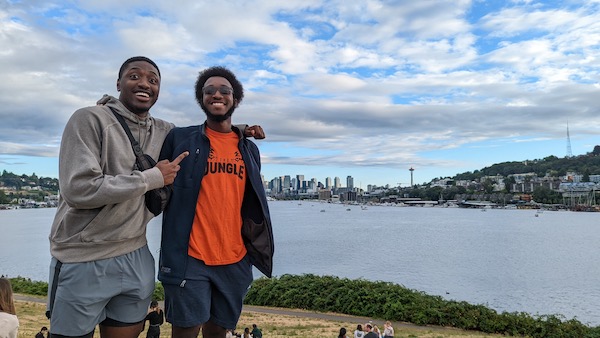As an international student from Haiti, I have always been aware of my national identity, especially when traveling abroad. The first time I visited the United States, I realized how my Haitianness was not just a label, but had tangible and observable consequences for how I integrated spaces, how I was perceived and what kind of learning, unlearning and resistance I would have to perform. When I decided to commit to Princeton in April 2021, this awareness was front and center in my mind. Would I find my belonging without compromising who I was at my core? I wanted college to be a space for growth, but I didn't want that growth to come at the expense of my authentic self. I wasn't averse to challenging myself and being uncomfortable, but at what cost? I knew there were many affinity groups on campus that intersected with my national identity that would help me protect and nourish what I thought to be my identity. What I didn't know whether or where I would find a home. I carried these questions and doubts with me on the plane.
In the fall of my first year, I attended an event organized by the African Students Association (PASA). It was an event of delicious food, traditional board games, music and fantastic atmosphere! There were people from diverse backgrounds: first-generation immigrants, international students from the African continent or the diaspora, black students of all backgrounds, generational African-American students, and all those beautiful and complex intersectional identities. I immediately felt at home! I understood the humor, people laughed at my jokes, the music was engaging, the energy electrifying and the food seasoned. I felt seen and welcomed as part of a larger community. At that moment, my national identity made space for my other identities to be. I became part of something greater: a cultural community.
I experienced the same feeling over and over again. It was not just happening at PASA events. It happened at the movie nights organized by the Davis International Center. It happened again at study breaks with other first-generation low-income students. And again at the weekly dinners of the Society of African Internationals (SAIP). And again at the game nights organized by the Black Student Union (BSU). Over time, I came to see community, identity and belonging as dynamic concepts that can only be spoken of in plural. So far at Princeton, I have learned to see myself as more than Haitian. I have been encouraged to recognize and explore other aspects of myself. Other identities that make me who I am. I stopped chasing this single community where I would feel at home and instead welcomed the idea of belonging through multiple communities and spaces. Thanks to a variety of student groups, only some of which I have officially joined (I am now the Vice-President of PASA), I was able to feel at home. Today, my Haitianness remains an extremely important part of who I am and of what drives me. Yet, I have found peace and joy in knowing and accepting that I am much more than that, however proud I am to be Haitian.







